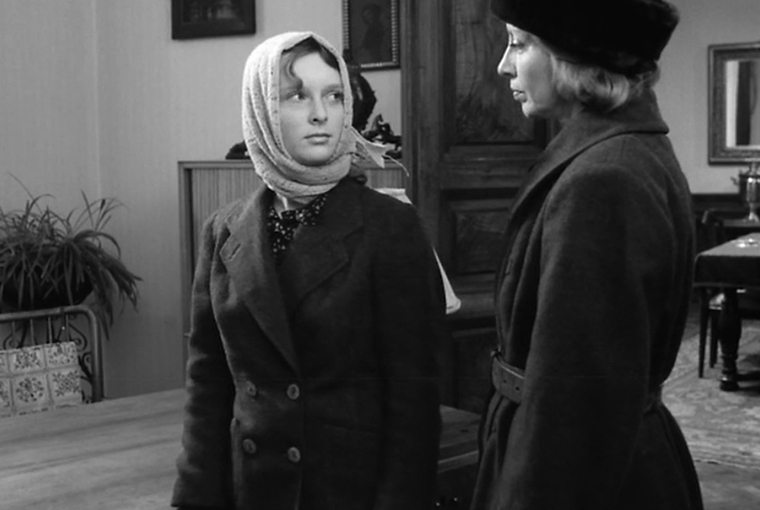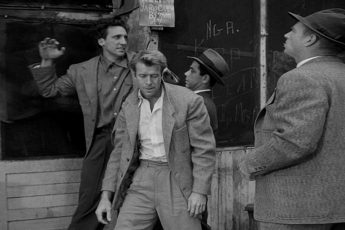Finding Strength in Remembering
Márta Mészáros’ Diary for My Children (Napló gyermekeimnek, 1984)
Vol. 141 (January 2024) by Lena Streitwieser
Memories allow us to recount events and people from the past, but they also become notoriously unreliable over time. Their accuracy wanes as events fade, and they can become warped by strong emotions. Memories can be either collective or individual, or both simultaneously. As such, memory can be an extremely useful tool for filmmakers to convey messages about a character’s relationship with the past, and how the past impacts their life in the present. In her 1984 film Diary for My Children, Hungarian filmmaker Márta Mészáros uses memory consistently throughout the film to create divisions and connections between characters, as well as to have those characters question the current state of their lives by comparing the present with how they lived in the past. For the female characters in the film, navigating the trials and tribulations of growing into a woman or upholding a certain image becomes even more taxing when faced with past trauma and current political strife. Mészáros’ troubled characters use remembering as testimony, whether factual or biased; as a tool for rebellion; and either reject or embrace remembering in order to make a political statement or better understand their lives.
Mészáros’ Diary for My Children follows an orphan teenage girl named Juli (Zsuzsa Czinkóczi) who, in 1940s Hungary, discovers a previously untapped personal identity through becoming more aware, via direct exposure, of the political injustices that broke her family apart. Over the course of her stay with her dreaded foster mother Magda (Anna Polony), aided by her makeshift parental figure and confidant János (Jan Nowicki), she encounters the oppression that plagued Hungary in the Stalinist era and in its aftermath. The very title, “Diary for My Children,” suggests a testimony of events that is meant to be preserved and passed down for a new generation and that is composed of one person’s experiences. It implies that its purpose is to resist forgetting; its aim is to show how history can mirror itself and play out again. It seeks to describe, to educate, and to withstand time, just like a person who bears witness to critical political junctures in history would if they wanted to try and prevent the next generation from following in their flawed footsteps. One of the most tragic examples of a character repeatedly bearing witness to the unfortunate unfolding of political repression is when János, a notable counter-political force to Magda, is jailed towards the end of the film. At this point in the film, János has undoubtedly become a father figure to Juli in a way that could never mirror her relationship with Magda. As such, his presence is protective and comforting to Juli.
This security blanket in Juli’s mind comes crumbling down when János is taken in the early hours of the morning. Mészáros further emphasizes Juli’s grief by casting Jan Nowicki as both János and as Juli’s late father, making his presence feel even more loving and safe, as well as emphasizing the connection Juli builds between them in her mind. Consequently, his absence becomes even more heartbreaking.1 When her biological father was taken away, young Juli could not comprehend what would ensue, nor did she grasp the severity of the situation. Roberta Culbertson in New Literary History notes that, “for a child, especially a young one, the line between life and death […] [is] all more fluid than [it] becomes in later life”.2 Young Juli’s naïveté has scarred her; in her youthful state she failed to see the consequences of her father’s absence. When János gets taken away, Juli is old enough to understand, so she weeps, both for János and for her late father. Diary for My Children catalogs the pain that comes with political repression, family tragedy, and even with the very process of growing up. In doing so, it resists the appeal of deliberate forgetfulness.
Beyond the fact that the process of holding onto memories becomes more difficult in the face of political injustices that jeopardize the safety of keeping those incriminating memories, the additional task of transitioning from girlhood to womanhood becomes increasingly arduous in an environment fraught with danger. Juli is discovering what it means to be an independent woman and no longer an impressionable girl. Through her steadfast resistance to Magda, she learns that she has the capacity to carve her own path and ultimately chooses to remember her pain, rather than forget it, as her method of defiance. Instead of succumbing to Magda’s attempts to make her conform to the Communist system, or the grief brought on by bearing witness to repeated crimes against those closest to her, Juli retaliates against an unfair system and draws upon personal strength to get through. In doing so, she exemplifies the difficult choices that womanhood poses, and the subsequent maturity that results in her ultimately making a decision. Trauma can undeniably shape victims’ lives and self-perception as they progress through the various stages of life.3 Diary for My Children demonstrates that experiencing profound trauma in adolescence builds personal maturity, which is exemplified in Juli’s turbulent progression into womanhood.
However, Juli is not the only character to connect memory and womanhood in Diary for My Children: Magda does so too, if in a starkly different way. Her past trauma has also molded her into a stronger person, though Magda’s strength is at the expense of other people, namely the prisoners she guards in her occupation as a prison warden. Mészáros masterfully contrasts Juli and Magda’s experiences, while remarkably suspending judgment when it comes to their respective choices. The film teaches viewers that trauma affects people in vastly different ways. As Roberta Culbertson suggests in New Literary History, trauma helps to form the basis of one’s personality and morals, and since both Magda and Juli have experienced traumatic events, they have been altered forever. Yet, they both choose to move through life in separate ways, and with contrasting values. Perhaps it is the reaction to their memories, not the memories themselves, that induce their respective methods of coping with their past (Juli’s being rebellion, Magda’s being forcible submission). Broadly speaking, Diary for My Children makes it evident that one prominent coping mechanism, when faced with a turbulent time tainted by traumatizing memories, is to seek control over one’s response to remembering, since one cannot control the existence of trauma itself.
Juli is perhaps the character that best embodies the use of memory as a tool of rebellion. As a lost and lonely teenager, Juli is shown to possess an intrinsic inclination to rebel, which is then strengthened by her dissatisfaction with Magda as a foster mother, the political system of Hungary at the time, and her dislike of school. After realizing that Juli will not see her as a replacement mother, Magda abandons trying to earn her love and respect, and instead tries to get Juli to obey her by becoming strict and cold. Magda argues with her, making attempts to dissuade her from holding on to her memories of her birth parents. Juli cannot accept that she must forget them and thus pushes back against Magda’s sternness by frequently dreaming of her parents in a utopian world, surrounded by picturesque nature and serene mountain scenes. The flashbacks Juli sees throughout the film of her and her parents in lush summer valleys framed by mountains represent Juli’s romanticization of the past and her yearning for lost loved ones, which starkly contrasts with her feelings towards the environment Magda fosters.4 She remembers her parents through these vignettes partially for comfort, and partially to resist the system that seeks to oppress her by forcing her to forget them, and thus to forgive the crimes perpetrated against them. Through Juli’s resistance to Magda, and by extension to the emergent system of oppression in Hungary at the time, Juli “embodies the student generation that will spark the 1956 rebellion”.5 As seen in later films from the autobiographical Diary trilogy that continue relating her story (in Diary for My Lovers from 1987 and Diary for My Father and Mother from 1990), Juli becomes a filmmaker and a political activist, so these small instances of her pushing back plant the seeds for her budding confidence and her subsequent career.
Remembering one’s previous pain can be one of the most effective ways of managing to survive amidst personal and political strife, either because holding on to memories can be a form of escape, or because forgetting them can be a source of change. Choosing to remember instead of forgetting is a challenging act, one that takes personal strength. When faced with a traumatic event, it is often easier to suppress and dismiss memories. Violence and trauma leave the survivor plagued with “bits of memory, flashing like clipped pieces of film held to the light, [that] appear unbidden […] as if possessed of a life independent of will or consciousness”.6 Someone faced with such a cruel fate, especially at a young age like Juli, might find solace in the possibility of forgetting. Yet, Juli does the opposite: she deliberately remembers, and deals with the pain it brings her, both to herself and to others. She uses her fond memories from the past as refuge from the melancholy she feels in the present. For example, Juli often pictures a happy memory of her and her parents picnicking in the lush summer forest to calm herself down, or to find an escape from the pain she experiences in the current moment.
Unlike Juli, Magda chooses to remember sparingly and conveniently to simply cope. As a higher-up in the Hungarian Communist Party and the warden of a penitentiary, she must exude authority and constantly be in command. This personality shift is significant, given she herself was beaten and tortured as a political activist in her youth. Magda must resist the memories of being beaten and tortured for her political beliefs so she can become the one to beat and torture others.7 Thus, the conscious grasp of memory is contrasted with the willful suppression of memory, with both attitudes being carried out for the same reason: to survive.
The purposeful juxtaposition of Magda’s and Juli’s responses to memories and suffering highlights dual ways in which memory can inform people’s lives. When Juli is on the train attempting to leave her town, she observes a deer running through a snowy open area into the barren forest and is brought back to a pleasant memory of her and her parents picnicking in the flourishing summer foliage. In an environment depicted as an eternal winter, cold and harsh, remembering a beautiful forest is the ultimate escape, which the deer, and subsequently Juli through her memory, run towards.8 Juli escapes through remembering, whereas Magda escapes through forgetting. Their opposite responses to remembering trauma are specific examples of two coping mechanisms vis-à-vis hardship, further demonstrating that actively reacting to specific emotionally charged memories is really what drives life forward, rather than just keeping those memories in one’s mind and thus inhibiting emotional development. Mészáros empathetically and poignantly portrays two women’s struggles to get by in everyday life while simultaneously dealing with profound mental trauma, and thereby humanizes two people that would otherwise be seen either as ignorant and arrogant (Juli), or as demanding and harsh (Magda). Evidently, Mészáros’ films “speak of women’s lives with a gritty truthfulness not seen before on the screen” by using memory as a tool to show audiences their honest, unfiltered lives.9
At times, personal memory can be influenced by collective memory, and provide a means to help withstand the political strife felt in the moment. Mészáros’ films often deal with issues specific to Hungarian society, “with its overlapping of rural and urban cultures and the consequent overlapping of generations raised apart”.10 This melting pot of generations, each with their own traumas, creates a societal fabric susceptible to being further torn apart by systemic oppression. Consequently, sharing memories and stories strengthens the fabric to combat a nationwide descent into political turmoil. Juli confides in her boyfriend Tomi (actor unknown), opening up to him about her parents, and simultaneously allowing him to open up to her about his mother being taken away during the Stalinist purges. Their individual memories become shared testimony when spoken aloud, turning them into a collective memory. They both come to realize how they were separately affected by an event that scarred a nation.
However, the characters themselves are not the only ones who share their testimonies of collective memory: Mészáros herself underwent very similar experiences to those of the film’s heroine. Mészáros, like Juli, was orphaned as a child during Stalin’s purges. As an inevitable consequence, in this film the personal blends with the fictional, just like memory; the film becomes Mészáros’ story as much as it is Juli’s. Catherine Portugues succinctly articulates this point: “Mészáros’ own father was a victim of Stalin’s purges and her intergenerational articulation of Stalinism embodied an unquestionable authenticity that continues to reverberate today in the films of a younger generation”.11 Mészáros’ film is her testimony informed by a nationwide recollection, the cultural and personal diary she is leaving for those to succeed her.
Diary for My Children is a forthright film that uses memory as a plot device to portray the inner workings of each character’s internal conflict and thought process. It is “at once autobiography, confession, document, and credible historical source material,” which is to say Mészáros’ blend of personal and historical is seamless and encapsulating.12 By using memory as a technique to humanize its flawed characters, Diary for My Children shows how remembering, in an effort to bear witness to history, to make sense of a troubled life, or to rebel against another person or political system, reveals a person’s innate morals and values. The film clearly shows that personal trauma dictates the course that life will take by shaping who people are and who they will become. As Juli comes to understand, growing up during a politically turbulent time induces many challenges that test personal strength, and her struggles in turn become a microcosm of the universal experience of coping with the reality of living with emotional wounds. Diary for My Children truly stands the test of time, and its implications will continue to reverberate through generations of Hungarians and any person of any origin who has experienced political, personal, or collective trauma.
References
- 1.Cf. Parvulescu, C. (2015). The Family of Victims: Stalinism Revisited in the 1980s in Orphans of the East: Postwar Eastern European Cinema and the Revolutionary Subject. Indiana University Press, 118-137; 130.
- 2.Culbertson, R. (1995). Embodied Memory, Transcendence, and Telling: Recounting Trauma, Re-Establishing the Self. New Literary History 26(1), 169–95; 181.
- 3.Culbertson, 1995.
- 4.Cf. Parvulescu, 2015.
- 5.Parvulescu, 2015, 126.
- 6.Culbertson, 1995, 169.
- 7.See Parvulescu, 2015.
- 8.Parvulescu, 2015.
- 9.Quart, B. (1993). Three Central European Women Directors Revisited. Cinéaste 19(4), 58–61; 59.
- 10.Martineau, B. H. (1980). The Films of Márta Mászáros or, the Importance of Being Banal. Film Quarterly 34(1), 21–27; 25.
- 11.Portugues, C. (Fall 2003). Intergenerational Memory: Transmitting the Past in Hungarian Cinema. Spectator 23:2: Quo Vadis European Cinema? 44-52; 47.
- 12.Ibid.




Leave a Comment